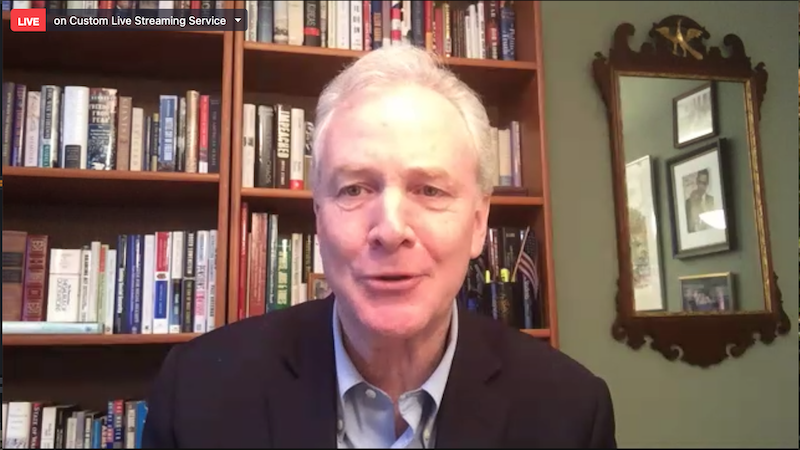@BryanRenbaum
U.S. Sen. Chris Van Hollen (D-Md.) emphasized Monday that is it critical that everyone in America eventually has access to high-speed internet.
Van Hollen made the remarks at a virtual discussion forum that largely focused on how Maryland’s school systems have attempted to address the digital divide which has been exacerbated by the coronavirus pandemic. The forum’s participants included educators, parents and community activists.
“It is our goal to make sure that every single household, business and person in the country is connected to high-speed internet in the coming years. I think that is absolutely essential for the success of our country,” Van Hollen said.
Van Hollen noted that the three federal pandemic relief bills that have been enacted into law in the past year have included substantial resources to help address the digital divide which has limited education prospects for many students who come from low-income families or who live in rural areas where it is difficult to get broadband internet service.
“The CARES Act included resources that could support connecting students to the internet through a couple of mechanisms. One was through the governor’s education funds (Governor’s Emergency Education Relief Fund). These were very flexible funds that went to state governments. And connecting students to the internet was one of the eligible uses…In December we also passed a bipartisan bill that included substantial resources-about $9 billion for dealing with connecting to the internet and about $4 billion of that was to help lower-income families connect to high-speed internet. And then most recently, in the American Rescue Plan, we have provided $7 billion for the E-Rate program, which is specifically designed to help students connect to the internet.”
Federal Communications Commission (FCC) acting chair Jessica Rosenworcel echoed sentiments similar to that of Van Hollen about the need to ensure universal internet access.
“There was a time before this pandemic when broadband was nice to have, not need to have. But the last year has proven conclusively that we need to reach 100% of us-everyone, everywhere.”
Rosenworcel said the pandemic has helped highlight digital disparities in the classroom.
“You get kids who have internet access at school but then go home at night and they can’t do their nightly schoolwork.”
Baltimore City Public Schools Chief Executive Officer (CEO) Sonja Santelises relayed that at the beginning of the pandemic BCPS purchased about 55,000 laptops and set up about 15,000 hotspots to help address the lack of access to high-speed internet among the city’s students.
“We did so because we really had no choice. In the hope that the federal government would ultimately intervene to provide those necessary resources. To reimburse school districts for these essential but clearly at the time unforeseeable expenses.”
Santelises noted that the most recent pandemic relief package provided the necessary reimbursements.
Prince George’s County Public Schools Chief Information Officer (CIO) Andrew Zuckerman said that it is critical that students have the appropriate resources to connect with teachers when they are not in the classroom.
“Moving forward those are going to be absolutely critical to successful hybrid instruction. And even post-pandemic….The world is very different for education. Enabling the resources at home to do homework and connect with teachers after hours is going to be critically important.”
Most of Maryland’s public schools reopened for some type of in-person instruction on March 1.




Recent Comments